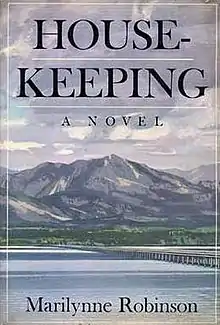Housekeeping (novel)
Housekeeping is a 1980 novel by Marilynne Robinson. The novel was a finalist for the Pulitzer Prize for Fiction and awarded the PEN/Hemingway Award for best first novel.
 First edition cover | |
| Author | Marilynne Robinson |
|---|---|
| Country | United States |
| Language | English |
| Published | 1980 Farrar, Straus and Giroux |
| Media type | Print (hardback & paperback) |
| Pages | 219 pp |
| ISBN | 0-374-17313-3 |
| OCLC | 6602826 |
| 813/.54 19 | |
| LC Class | PS3568.O3125 H6 1980 |
In 2003, the Guardian Unlimited named Housekeeping one of the 100 greatest novels of all time,[1] describing the book as "Haunting, poetic story, drowned in water and light, about three generations of women." Time magazine also included the novel in its TIME 100 Best English-language Novels from 1923 to 2005.[2]
Plot
Ruthie narrates the story of how she and her younger sister Lucille are raised by a succession of relatives in the fictional town of Fingerbone, Idaho (some details are similar to Robinson's hometown, Sandpoint, Idaho). Eventually their aunt Sylvie (who has been living as a transient) comes to take care of them. At first the three are a close knit group, but as Lucille grows up she comes to dislike their eccentric lifestyle and moves out. When Ruthie's well-being is questioned by the courts, Sylvie returns to life on the road and takes Ruthie with her.
The novel treats the subject of housekeeping, not only in the domestic sense of cleaning, but in the larger sense of keeping a spiritual home for one's self and family in the face of loss, for the girls experience a series of abandonments as they come of age.
The events take place in an uncertain time, in that no dates are mentioned; however, Ruthie refers to her grandfather living in a sod dugout in the Midwest, before his journey to Fingerbone, while she herself traverses adolescence sometime in the latter half of the 20th century, as Ruthie reads the novel Not as a Stranger, a bestseller from 1954.
Characters
- Ruth – Ruthie is the narrator of the story. She narrates from the perspective of the transparent eyeball. This narration style was used by the transcendentalist authors that influenced Robinson, including Ralph Waldo Emerson.[3]
- Lucille – Ruth's younger sister.
- Helen – the mother of Ruthie and Lucille, who commits suicide.
- Sylvie – Helen's younger sister, who comes to Fingerbone to take care of Ruthie and Lucille.
- Molly – Helen's older sister. Molly left Fingerbone to do missionary work as a bookkeeper in the Hunan Province of China.
- Sylvia Foster – Ruthie's grandmother. Sylvia lived her entire life in Fingerbone, accepted the basic religious dogma of an afterlife, and lived her life accordingly.
- Edmund Foster – Ruthie's grandfather and Sylvie's father. He was raised in a house, dug out of the ground, in the Middle West. He is consumed with wanderlust and a desire to paint mountains. This desire leads to his job on a train and the related events form the foundation of the novel. Working on the train, he is killed in its crash into the lake of Fingerbone.
- Lily Foster – Sylvia Foster's sister-in-law, one of two who came from Spokane to care for Ruthie.
- Nona Foster – the other sister-in-law.
- Bernice – a friend of Helen's who lived below Ruthie and her mom, Helen, when they lived in a tall grey building. Bernice urged Helen to visit her estranged mother and lent Helen her car so she could travel to see her (the same car Helen used to drive herself off the cliff).
- Ettie – a friend of Ruthie's grandmother, Sylvia Foster. A tiny old lady, whose skin was the color of toadstools.
Film adaptation
The film adaptation Housekeeping was released in 1987. It stars Christine Lahti and was directed by Bill Forsyth. The film was shot in and around Nelson, British Columbia.
References
- Robert McCrum (2003-10-12). "The 100 greatest novels of all time: The list". London: The Guardian Unlimited.
- "All Time 100 Novels". Time. 2005-10-16. Retrieved 2010-05-04.
- Ralph Waldo Emerson
External links
| Wikiquote has quotations related to: Housekeeping (novel) |